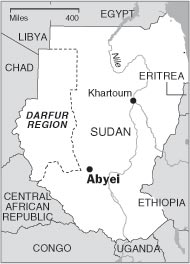Ilankai Tamil Sangam30th Year on the Web Association of Tamils of Sri Lanka in the USA |
|||
 Home Home Archives Archives |
Obama Presses for Peace in Likely Sudan PartitionBy NEIL MacFARQUHAR, The New York Times, September 24, 2010
UNITED NATIONS — After months of leaving Sudan policy on a back burner, President Obama put the weight of his administration and his own personal esteem in Africa on the line Friday, demanding that north and south Sudan ensure that their likely split into two nations early next year proceed peacefully. At a high-level Sudan meeting on the sidelines of the United Nations General Assembly, Mr. Obama said Washington would normalize relations should the Jan. 9 referendum for the independence of southern Sudan be carried off calmly and the Darfur conflict be settled. Failing in either would bring further isolation, he warned. If Khartoum fulfills its obligations in settling the conflicts, then the United States will support agricultural development, expand trade and investment, exchange ambassadors and eventually lift sanctions, Mr. Obama said. “What happens in Sudan in the days ahead may decide whether a people who have endured too much war move forward towards peace or slip backwards into bloodshed,” Mr. Obama said, establishing the warning tone taken by all speakers at the session. With the southern Sudan independence vote a little more than 100 days away, preparations are greatly lagging. Voter registration that was to have been done by the end of August remains incomplete, and many technical issues are unsettled. Almost nothing has been done to prepare for a secondary referendum to decide the fate of Abyei, a contested area of important oil deposits. The two sides are dragging their feet on details of the eventual divorce, given that the roughly 4.8 million eligible voters in the south, the only side voting, are likely to choose independence. With independence scheduled six months after the vote, major issues like citizenship, borders and the division of oil revenue have not been negotiated. At least 1.5 million southerners are believed to be living in Khartoum, the capital, and an unknown number of northerners in the south. United Nations officials had intended the meeting to be a small gathering of foreign ministers to stress in the presence of senior representatives of both sides that the referendum not be delayed. But it ballooned into something much larger after President Obama decided to attend. About 40 foreign leaders or senior officials signed up to speak. Ultimately the meeting became a highly visible means to serve notice that the onus is on the Sudanese to carry out the last, hardest stages of the Comprehensive Peace Agreement they signed in 2005. All the governments participating, including major Security Council members like Russia and China, as well as major pan-African organizations, endorsed a final communiqué vowing that the referendum would be held on time and peace respected no matter what the outcome. It also stressed the need to support peacekeeping efforts in Darfur, the embattled western Sudanese region where violence flared anew in recent months. The Comprehensive Peace Agreement ended decades of war pitting the north, dominated by Arab Muslims, against the Christian and animist south. The civil war left two million people dead and millions more homeless. Sudan borders on nine other African states, and many speakers worried aloud that any instability “will not stop at its borders,” said Sheik Hamad bin Khalifa al-Thani, the leader of Qatar, which is trying to negotiate a peace among the Darfur militias. The Sudanese had sought a closed meeting, but ultimately it was open, leaving Sudan’s vice president, Ali Osman Taha, and Salva Kiir, the president of the south and a vice president in the north, to sketch their differences in diplomatic terms. Mr. Taha assured the gathering that the referendum would be held on time, but he criticized the international community for supporting peace on one hand while continuing the “demonization” of the north on the other. The International Criminal Court’s indictment of Sudan’s president, Omar Hassan al-Bashir, on war crimes charges, economic sanctions, the lack of debt relief and Sudan’s presence on the United States list of state sponsors of terrorism were all intended to weaken the country, he said. Mr. Kiir said that the Jan. 9 referendum date was sacred and that any technical delays had to be overcome. “Any delays risk the return to instability and violence,” he said. Numerous aid organizations, concerned that a lack of attention might encourage opponents of the referendum to delay it, hailed the meeting. But some were outraged that the final communiqué welcomed a commitment by Sudan to pursue war criminals, given that Mr. Bashir has mocked his own indictment. The final communiqué could not really attack Mr. Bashir while encouraging him to respect the referendum deadline, said two senior officials involved with the negotiations, who said the reference to Sudan’s commitment to pursue war criminals was to ensure that the issue of impunity would not be ignored.
Added: General Information on Sudan Official Name: Republic of Sudan
|
||
|
|||
